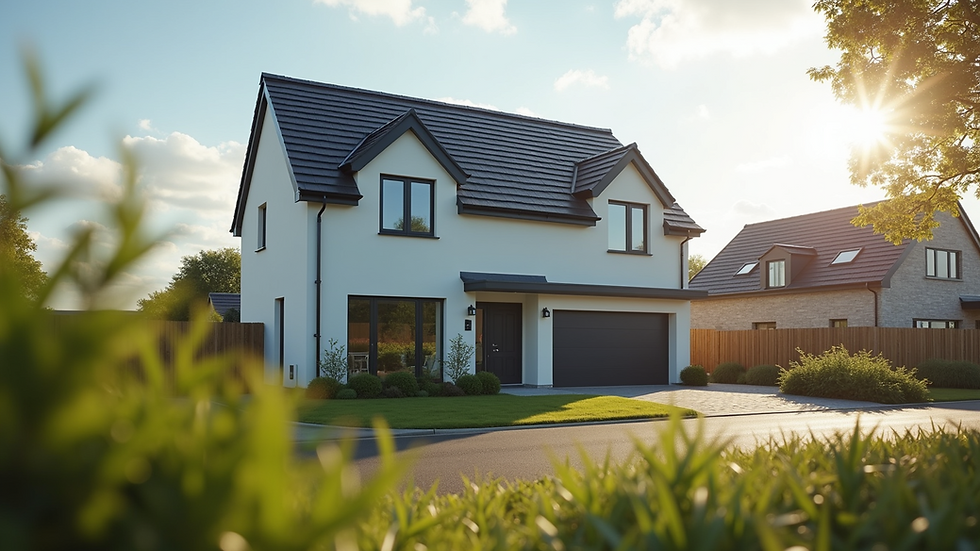Five Building Types and Contractor Services
- Isidro Andrade
- Nov 10, 2025
- 4 min read
When it comes to construction, understanding the different building types and the contractor services associated with each is essential. Whether you are planning a new project or renovating an existing structure, knowing the specifics of each building type can help you make informed decisions. This guide explores five common building types and the contractor services that best suit them, providing practical insights and actionable recommendations.
Understanding Building Types and Services
Construction projects vary widely depending on the type of building involved. Each building type has unique characteristics, materials, and structural requirements. Contractors specializing in these types offer tailored services to ensure safety, durability, and compliance with regulations.
Here are five common building types:
Residential Buildings
Commercial Buildings
Industrial Buildings
Institutional Buildings
Agricultural Buildings
Each type demands specific expertise from contractors, from foundation work to finishing touches.
Residential Buildings
Residential buildings include single-family homes, apartments, condominiums, and townhouses. These structures focus on comfort, aesthetics, and functionality for living spaces.
Contractor Services for Residential Buildings:
Design and Planning: Contractors collaborate with architects to create layouts that maximize space and natural light.
Foundation and Framing: Proper foundation work is critical to prevent future issues like settling or cracking.
Roofing and Insulation: Energy efficiency is a priority, so contractors use materials that provide good insulation.
Interior Finishing: This includes drywall, flooring, cabinetry, and painting.
Landscaping: Many contractors offer landscaping services to enhance curb appeal.
Example: A contractor working on a new home might recommend energy-efficient windows and solar panels to reduce utility costs.

Commercial Buildings
Commercial buildings serve business purposes such as offices, retail stores, restaurants, and hotels. These buildings often require more complex systems for HVAC, electrical, and plumbing.
Contractor Services for Commercial Buildings:
Structural Engineering: Ensuring the building can support heavy loads and withstand environmental factors.
Code Compliance: Contractors must adhere to strict building codes and accessibility standards.
System Installation: Includes advanced HVAC, fire suppression, and security systems.
Tenant Fit-Outs: Customizing interior spaces to meet tenant needs.
Maintenance Services: Ongoing support to keep the building operational.
Example: A contractor renovating a retail space might install energy-efficient lighting and optimize the layout for customer flow.

What are type 4 buildings?
Type 4 buildings, often referred to as Heavy Timber or Mill Construction, are characterized by large wooden beams and columns. These buildings combine the strength of wood with fire-resistant properties due to the mass of the timber.
Key Features of Type 4 Buildings:
Heavy Timber Framework: Large wooden members provide structural support.
Fire Resistance: The thick timber chars on the outside, protecting the inner core.
Open Interiors: Fewer columns allow for flexible interior layouts.
Aesthetic Appeal: Exposed timber beams add a rustic or industrial look.
Contractor Services for Type 4 Buildings:
Specialized Timber Construction: Skilled carpentry and joinery are essential.
Fireproofing Treatments: Applying fire retardants and protective coatings.
Custom Fabrication: Creating unique timber components off-site.
Restoration and Preservation: Maintaining historic heavy timber structures.
Example: Contractors building a brewery or loft-style office might choose type 4 construction for its durability and design appeal.
Industrial Buildings
Industrial buildings include factories, warehouses, and distribution centers. These structures prioritize functionality, space, and durability to support manufacturing and storage.
Contractor Services for Industrial Buildings:
Steel Frame Construction: Provides strength and flexibility for large open spaces.
Concrete Flooring: Durable surfaces that withstand heavy machinery.
Loading Dock Installation: Facilitates efficient shipping and receiving.
Utility Systems: Specialized electrical and plumbing for industrial equipment.
Safety Features: Fire suppression, ventilation, and emergency exits.
Example: A contractor constructing a warehouse might install reinforced concrete floors and high bay lighting to accommodate forklifts and inventory racks.
Agricultural Buildings
Agricultural buildings include barns, silos, greenhouses, and storage sheds. These structures support farming operations and require materials that withstand weather and pests.
Contractor Services for Agricultural Buildings:
Metal Building Systems: Durable and low-maintenance options for barns and storage.
Climate Control: Ventilation and heating systems for livestock and crops.
Foundation Work: Stable bases to prevent settling in rural soil conditions.
Custom Design: Tailored layouts for specific farming needs.
Repair and Maintenance: Seasonal upkeep to extend building life.
Example: Contractors might build a metal barn with insulated panels to protect animals during winter.
Choosing the Right Contractor for Your Project
Selecting the right contractor is crucial for the success of any building project. Here are some tips to help you make the best choice:
Experience: Look for contractors with a proven track record in your building type.
Licensing and Insurance: Verify credentials to avoid legal and financial risks.
References and Reviews: Check past client feedback for reliability and quality.
Communication: Choose contractors who keep you informed and involved.
Budget and Timeline: Ensure they can deliver within your financial and scheduling constraints.
Working with a contractor who understands the nuances of your building type will save time and money while ensuring a high-quality result.
Enhancing Your Project with Expert Contractor Services
Contractor services go beyond basic construction. Many offer value-added services that improve your building’s performance and longevity:
Sustainability Consulting: Incorporating green building practices and materials.
Technology Integration: Smart building systems for energy management and security.
Custom Fabrication: Unique architectural elements and finishes.
Post-Construction Support: Maintenance plans and warranty services.
By leveraging these services, you can create a building that meets your needs today and adapts to future demands.
For more information on specialized contractor services and innovative building solutions, explore trusted resources like Elite Buildings.
Understanding the different building types and the contractor services tailored to each can make your construction project smoother and more successful. Whether you are building a home, office, factory, or barn, choosing the right approach and expertise is key to achieving your vision.



Comments